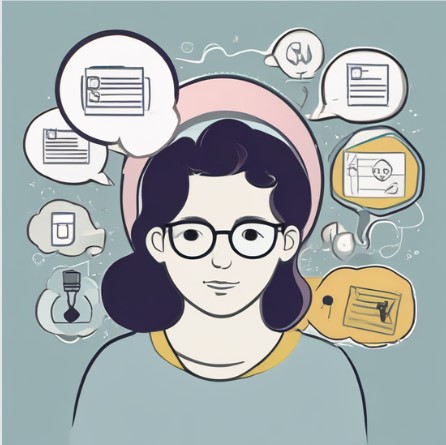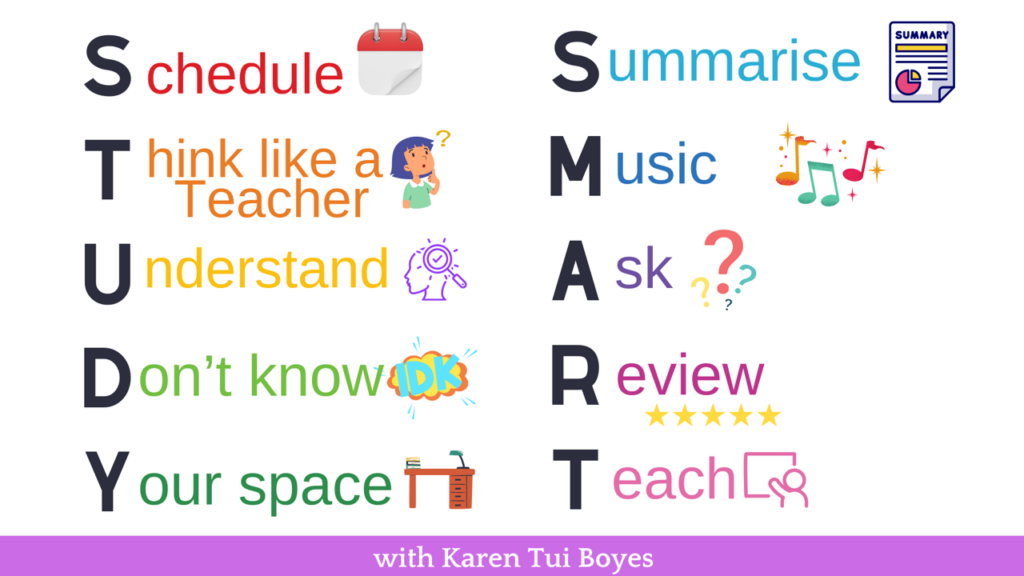Study Smart – An Overview of Effective Techniques
Study Smart – An Overview of Effective Techniques
Just like any skill, there are specific strategies and techniques that, once mastered, can boost your success. Whether you are learning badminton, propagating flowers, or backing a trailer, knowing the ‘tricks of the trade’ helps to make your path to mastering the skill easier. Studying for a test or an exam is the same. Below are some techniques and strategies to support your study efforts, making them more effective and efficient.
Schedule
Start by making a plan. Grab a diary and design a weekly schedule of what you must study or learn over the week. Start by adding everyday commitments such as sports practice, cultural activities, paid work, and family responsibilities. Remember to add meal times and schedule short breaks in your day. Now add the subjects you need to study. Give yourself plenty of time per subject. It is recommended that you allow your year level in hours per week. That means if you are in year 8, schedule 8 hours a week to review, study, and learn. If you are in year 12, schedule twelve hours a week. It depends on what you are learning and its complexity.
Think Like a Teacher
When you are reviewing your notes, reading, and learning information for an exam, it helps to think like a teacher. Just reading the information is not enough. Ask yourself, “What questions would a teacher ask about this content?” Another tip is to practice old exam papers, as this will familiarise you with how questions are phrased and the types of questions that are asked. Write your own questions to test yourself, or work with a friend and test each other.
Understand
Knowing, understanding, and being able to apply information are three different things. Knowing involves recalling or recognising facts, terms, basic concepts, or answers without necessarily understanding their full meaning. It’s the most basic level of learning, often focused on memorisation. Understanding goes beyond memorisation. It involves comprehending the meaning of information, grasping concepts, and being able to explain them in your own words. Understanding is about making sense of information and seeing how it fits into a broader context. Applying is using knowledge and understanding in new and concrete situations. It involves transferring learning to different contexts, solving problems, and implementing skills or concepts in practical scenarios.
Study for understanding so you can apply the information at test time. Keys to knowing you understand include being able to explain it accurately, create different examples or analogies, apply the information in different situations, connect concepts, ask further questions, and ultimately teach someone else.
Don’t Know
Knowing what to study is a fundamental key to success. The key is to focus on what you don’t know. Repetition of what you already know is mostly a waste of time. Grab your old assignments and practice exam papers, and start learning the questions you answered incorrectly. Take time to revisit the information that confuses you and that you do not understand. This can be challenging, so stick with it. Perhaps you can find different sources of information, such as other teachers explaining the content online or a song that helps reinforce the concepts – there are hundreds for science online. Use flashcards or a spreadsheet to create learning logs with what you do and don’t know, and spend most of your attention on the information you don’t know.
Your Space
Having a designated study space is useful. The worst place to study is on your bed, as the bed is for sleep. You can study in your room at a desk, on a chair, or on the floor, just not on your bed. The association of bed and study will often cause you either to go to sleep while studying or to keep your brain active while you are trying to sleep. Test different places and spaces to see which places help you concentrate and focus most.
Summarise
Just taking notes in class or copying from the board/screen is not enough for learning to happen. You need to do something with the notes. One idea is to purchase a small notebook per subject and summarise your notes from class on one page of the notebook. A small notebook means you will need to summarise, as rewriting notes is very ineffective. A summary should have the main points, key terms and definitions, diagrams and visuals, and questions you still have to ask or research to understand the lesson.

Music
The most frequent question I am asked about study relates to music. Is it useful or harmful to study with? The answer is – it depends! If you have music in the background and you find yourself singing along to the songs or listening to the music, it is not likely to be helpful. The reason is that as smart as your brain is, it cannot focus on two sources of words at the same time. You cannot read or write words and listen to a different source of words simultaneously. However, if you put the music on and do not hear it, this is generally helpful for most people. In this case, the music creates ‘white noise’ which allows the brain to focus and concentrate. The best types of music for study include instrumental (no words) and classical music called Baroque. You can google study playlists – make sure there are no adverts to distract you!
Ask
This is one of the most challenging tips for many. If you don’t know – ask. If you are in a classroom that does not have a positive asking culture, ask your teacher after class, send an email, or search online for other teachers teaching this lesson or concept. Research clearly shows that students who ask questions get higher marks than those who don’t ask.
Review
Did you know that, on average, the brain forgets up to 70% of information taught within three days of being taught it? Repetition of ideas, concepts, and knowledge is a key strategy for study success. Re-read your summaries within 24 hours of the class and refer back to them a week, month, and every six months later. Another key technique is to repeat or review in different ways. Reading, talking, creating mind maps, using flashcards, participating in group discussions, practising with quizzes, applying concepts in real-world scenarios, and using mnemonic devices.
Teach
As I mentioned earlier, being able to teach someone what you are learning is one of the highest forms of understanding. You might chat about your learning with a peer or your family at dinner. You could host a study party where classmates talk and explain ideas and concepts to each other. Ultimately, becoming a tutor to younger students can be a great way to reinforce your knowledge and understanding. By mastering these study techniques, you can make your study efforts more effective and efficient, leading to better results and a deeper understanding of the material.
Study Smart & Pass!

Published on Friday, July 26th, 2024, under Study Skills
